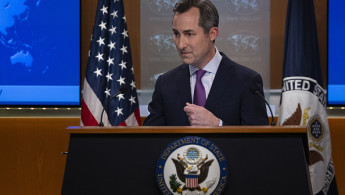US says 'time to finalise' Gaza deal after captive deaths
The United States on Tuesday called for urgency and flexibility to finalise an agreement between Israel and Hamas for a truce in Gaza, after the recent deaths of six hostages.
"There are dozens of hostages still remaining in Gaza, still waiting for a deal that will bring them home. It is time to finalize that deal," State Department spokesman Matthew Miller told reporters.
"The people of Israel cannot afford to wait any longer. The Palestinian people, who are also suffering the terrible effects of this war, cannot afford to wait any longer. The world cannot afford to wait any longer," Miller said.
Miller said that the United States will work "over the coming days" with mediators Egypt and Qatar "to push for a final agreement."
One key sticking point has been Israeli Prime Minister Benjamin Netanyahu's insistence that Israeli troops remain at the border between Gaza and Egypt.
"The bridging proposal that we put forward, that the government of Israel agreed to, it did include the removal of the [Israeli forces] from densely populated areas. That includes the Philadelphi corridor," Miller said, referring to the Israeli army.
"We are opposed to the long-term presence of [Israeli] troops in Gaza," he said.
"Finalizing an agreement will require both sides to show flexibility. It will require that both sides look for reasons to get to yes rather than reasons to say no."
Pressure has been growing on Israel with Britain's new Labour government on Monday saying it would stop some arms exports to Israel due to the "clear risk" they could be used in a serious breach of international humanitarian law.
Britain informed the United States, a close ally of both countries, before it made the decision, Miller said.
"It's not that we disagree with the UK position, it's that the UK makes an assessment based on their legal framework," Miller said.
"We make an assessment based on our own legal frameworks," he said, adding that the United States was still reviewing incidents.
The State Department in May said it did not have enough evidence to block shipments of weapons but that it was "reasonable to assess" that Israel has used arms in ways inconsistent with standards on humanitarian law.
The United States provides about $3 billion in weapons to Israel each year.





 Follow the Middle East's top stories in English at The New Arab on Google News
Follow the Middle East's top stories in English at The New Arab on Google News

![MP Essam Diab's pursuit to block TikTok in Egypt has revived an already ongoing debate in the country. [Getty]](/sites/default/files/styles/image_330x185/public/1230748046.jpeg?h=a5f2f23a&itok=-8MqBLLC)
